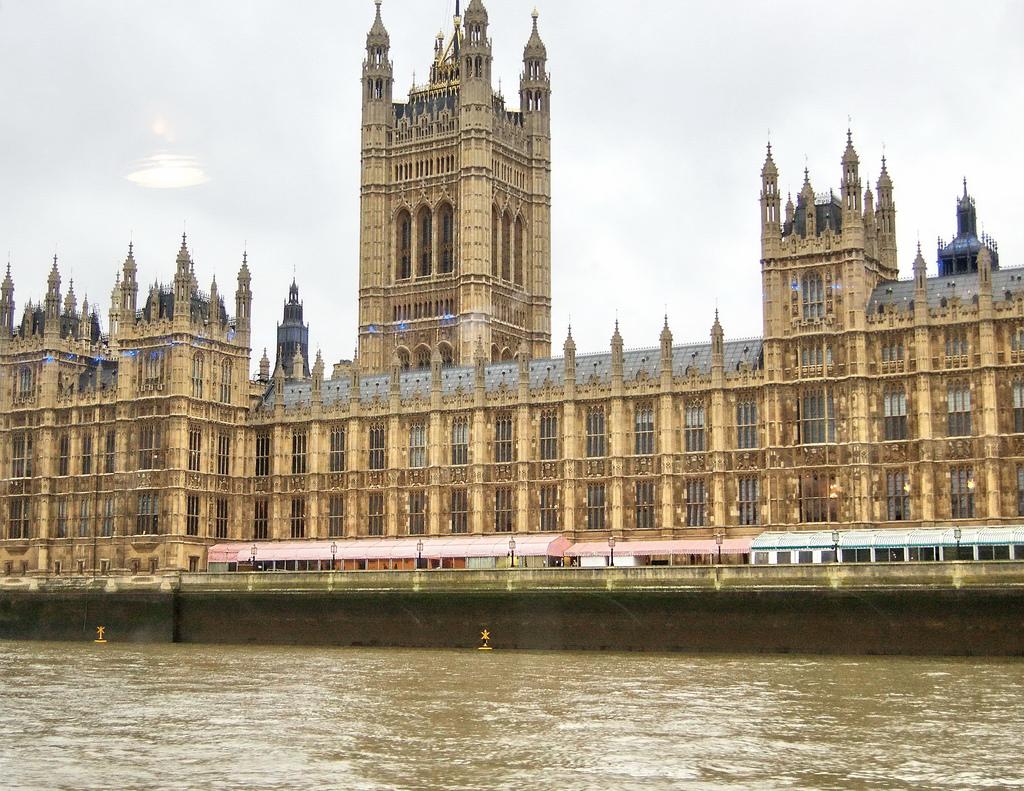
Here you can find more information about the Magna Carta, The Magna Carta.
The UK Parliament
Today, the seat of the UK government is the Houses of Parliament at Westminster in London, but many powers for regional government have been devolved to Wales, N. Ireland and especially Scotland (see The Devolved Parliaments - Tasks ). The main units of the UK Parliament are the House of Commons, the House of Lords and the Monarch.
Watch the video below for a brief explaination of parliament and government in the UK.
The House of Commons is the seat of the Members of Parliament (MPs), who are elected by the people. Each MP represents one area of the country called a constituency and most belong to a political party. The few who do not are called "independents". There were 650 seats in the House of Commons, but this is now being reduced to 600.
The House of Lords is under restructuring. At the moment, there are about 753 members. These are the Lords Spiritual (2 archbishops and 24 bishops) and the Lords Temporal (peers). Some of the peers are hereditary peers. These are fewer than before and they are no longer able to pass on their seat to their descendants. Life peers are appointed by the Queen on the advice of the Prime Minister. They are individuals who have in some way made an important contribution to society.
Since 2009, the UK has had a Supreme Court, which is the final court of appeal for all civil cases and for criminal cases in Wales, England and N. Ireland. Judicial authority has been transferred from the House of Lords to this new Supreme Court. It has twelve Justices.
The Monarch: What are the duties of the monarch with respect to the UK Parliament? Does she/he have any power?
The UK Government
The government is formed by the party which wins a general election and it is led by the Prime Minister and his Cabinet. The Cabinet consists of government ministers. Each minister is responsible for one area of government administration, such as the Foreign Secretary (Secretary of State for Foreign and Commonwealth Affairs), the Home Secretary (Secretary of State for the Home Department), the Chancellor of the Exchequer (finance), the Secretary of State for Health, Chief Whip (makes sure party members vote as the party desires), etc. Members of the ruling party who are not in the government are called backbenchers.
The political party/parties which do not form the government are called the Opposition. It has a parallel Shadow Cabinet, Shadow ministers and backbenchers.
Lawmaking in the House of Lords - the journey of a bill
This short film (3:57 min.) follows a bill as it moves from the Commons into the House of Lords and through each stage to royal assent.
Elections
In a general election the people choose whom they would like to govern the country. A general election takes place every 5 years, in May, but Parliament can decide to have one earlier than this. The three largest political parties in the UK are the Conservative Party, the Labour Party and the Liberal Democrats. Before a general election, each party presents its policies and then the candidates from each party campaign across the country, each in his/her own constituency, where they do their best to persuade the people to vote for them and their party’s policies.
Watch the videos about voting and then explain the terms.
- electorate
- constituency
- MP
- dissolve parliament
- Conservatives
- Labour
- Liberal Democrats
- Green Party
- UK Independence Party
- election manifesto
- polling station
- electoral register
- ballot paper
- ballot box
- Downing Street
- House of Commons
- Cabinet
- minister
Research
Find out about the present UK government. Work in pairs/groups and make a radio interview with either the present Prime Minister and/or the leader of the Opposition. You could include information about the last election, the composition of the government, the Opposition, political parties, the Cabinet, the most important ministers and some of the main issues and bills under discussion. You can record the interview using audacity.
Wikipedia and Home page of the UK Parliament are useful sources of information.